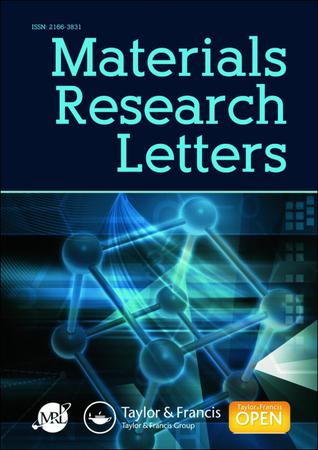Key role of temperature on delamination in solid-state additive manufacturing via supersonic impact
IF 7.9
1区 材料科学
Q1 MATERIALS SCIENCE, MULTIDISCIPLINARY
引用次数: 0
Abstract
Cold spray (CS) has emerged as a representative of solid-state additive manufacturing (AM) via supersonic impact. It enables a high deposition rate of solid-state microparticles. Delamination, however, tends to occur when depositing too thick; this remains to be conquered. Here, a CS-like process, warm spray (WS), was presented. Interestingly, it was found that the appropriate increase in particle temperature can effectively reduce the residual stress amplitude, relieving the concentrated tensile stress and safeguarding the additively manufactured components from interfacial delamination even when depositing too thick. The key role of temperature on delamination was identified in solid-state AM via supersonic impact. GRAPHICAL ABSTRACT IMPACT STATEMENT It makes a clear understanding of the delamination issue in solid-state AM via supersonic impact, providing scientific guidance for technological/equipment upgrading and safeguarding the structural integrity of complex, large-size components.温度对超声冲击固态增材制造中分层的关键作用
冷喷涂(CS)已经成为通过超音速冲击的固态增材制造(AM)的代表。它能够实现固态微粒的高沉积速率。然而,当沉积过厚时,往往会发生分层;这还有待克服。在这里,提出了一种类似CS的工艺,即温喷(WS)。有趣的是,研究发现,适当提高颗粒温度可以有效地降低残余应力幅度,缓解集中的拉伸应力,并保护添加制造的组件即使在沉积过厚时也不会出现界面分层。通过超声冲击在固态AM中确定了温度对分层的关键作用。图形摘要影响声明它清楚地了解了固态AM通过超声冲击的分层问题,为技术/设备升级和保护复杂、大尺寸部件的结构完整性提供了科学指导。
本文章由计算机程序翻译,如有差异,请以英文原文为准。
求助全文
约1分钟内获得全文
求助全文
来源期刊

Materials Research Letters
Materials Science-General Materials Science
CiteScore
12.10
自引率
3.60%
发文量
98
审稿时长
3.3 months
期刊介绍:
Materials Research Letters is a high impact, open access journal that focuses on the engineering and technology of materials, materials physics and chemistry, and novel and emergent materials. It supports the materials research community by publishing original and compelling research work. The journal provides fast communications on cutting-edge materials research findings, with a primary focus on advanced metallic materials and physical metallurgy. It also considers other materials such as intermetallics, ceramics, and nanocomposites. Materials Research Letters publishes papers with significant breakthroughs in materials science, including research on unprecedented mechanical and functional properties, mechanisms for processing and formation of novel microstructures (including nanostructures, heterostructures, and hierarchical structures), and the mechanisms, physics, and chemistry responsible for the observed mechanical and functional behaviors of advanced materials. The journal accepts original research articles, original letters, perspective pieces presenting provocative and visionary opinions and views, and brief overviews of critical issues.
 求助内容:
求助内容: 应助结果提醒方式:
应助结果提醒方式:


